| Listing 1 - 10 of 11 | << page >> |
Sort by
|
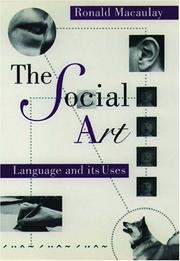
ISBN: 0195106571 9780195106572 Year: 1994 Publisher: Oxford Oxford university press
Abstract | Keywords | Export | Availability | Bookmark
 Loading...
Loading...Choose an application
- Reference Manager
- EndNote
- RefWorks (Direct export to RefWorks)
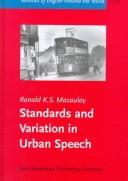
ISBN: 9027248788 1556197179 9786613358370 1283358379 9027275750 9789027248787 9789027275752 9781556197178 9781283358378 6613358371 Year: 1997 Volume: 20 Publisher: Amsterdam Benjamins
Abstract | Keywords | Export | Availability | Bookmark
 Loading...
Loading...Choose an application
- Reference Manager
- EndNote
- RefWorks (Direct export to RefWorks)
Standards and Variation in Urban Speech is an examination and exploration of the aims and methods of sociolinguistic investigation, based on studies of Scottish urban speech. It criticially examines the implications of the notions 'vernacular', 'standard language', 'Received Pronunciation', 'social class', and 'linguistic insecurity'. Through a combination of quantitative and qualitative methods using examples from comedians' jokes, dialect poetry, formal and informal interviews, and personal narratives, the work illustrates the actual norms that speakers exemplify in various ways.
Scots language --- Urban dialects --- Variation --- Spoken Scots --- Standardization --- English language --- Dialectology --- Scotland --- English language, Scots --- Lallans language --- Lowland Scots language --- Scots English language --- Scottish language (Germanic) --- Germanic languages --- Dialects, Urban --- Urbanisms (Linguistics) --- Cities and towns --- Language and languages --- Languages in contact --- Sociolinguistics --- Spoken Scots. --- Variation. --- Standardization. --- Dialects --- Scots language - Variation --- Urban dialects - Scotland --- Scots language - Spoken Scots --- Scots language - Standardization
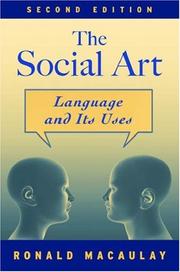
ISBN: 1283232375 9786613232373 0199908419 9780199908417 9780195187960 0195187962 9781283232371 6613232378 0197722660 Year: 2006 Publisher: Oxford Oxford university press
Abstract | Keywords | Export | Availability | Bookmark
 Loading...
Loading...Choose an application
- Reference Manager
- EndNote
- RefWorks (Direct export to RefWorks)
Taking the readers on a tour through the world of languages, this book uses jokes, anecdotes, quotations, and examples to introduce readers to a range of contemporary linguistic knowledge. It covers topics, such as language acquisition, phonology, morphology, syntax, semantics, dialects, conversation, narrative, swearing, and many others.
Sociolinguistics. --- Language and languages. --- Foreign languages --- Languages --- Anthropology --- Communication --- Ethnology --- Information theory --- Meaning (Psychology) --- Philology --- Linguistics --- Language and languages --- Language and society --- Society and language --- Sociology of language --- Language and culture --- Sociology --- Integrational linguistics (Oxford school) --- Social aspects --- Sociological aspects --- Sociolinguistics --- 800:316 --- 800:316 Sociolinguistiek --- Sociolinguistiek
Book
ISBN: 0230279317 0230279309 9780230279308 9780230279315 Year: 2011 Publisher: Basingstoke: Palgrave MacMillan,
Abstract | Keywords | Export | Availability | Bookmark
 Loading...
Loading...Choose an application
- Reference Manager
- EndNote
- RefWorks (Direct export to RefWorks)
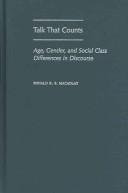
ISBN: 0195173821 0195173813 Year: 2005 Publisher: Oxford Oxford University Press
Abstract | Keywords | Export | Availability | Bookmark
 Loading...
Loading...Choose an application
- Reference Manager
- EndNote
- RefWorks (Direct export to RefWorks)
Dialectology --- Sociolinguistics --- English language --- Great Britain
Book
Year: 1980 Publisher: Rowley Newbury House
Abstract | Keywords | Export | Availability | Bookmark
 Loading...
Loading...Choose an application
- Reference Manager
- EndNote
- RefWorks (Direct export to RefWorks)
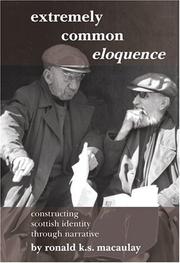
ISBN: 9789004483880 9789042017641 Year: 2005 Publisher: Leiden; Boston : BRILL
Abstract | Keywords | Export | Availability | Bookmark
 Loading...
Loading...Choose an application
- Reference Manager
- EndNote
- RefWorks (Direct export to RefWorks)
Extremely Common Eloquence presents a detailed analysis of the narrative and rhetorical skills employed by working-class Scots in talking about important aspects of their lives. The wide range of devices employed by the speakers and the high quality of the examples provide convincing evidence to reject any possible negative evaluation of working-class speech on the basis of details of non-standard pronunciation and grammar. In addition to this display of linguistic accomplishment the examples examined show how these skills are employed to communicate important aspects of Scottish identity and culture. Although the political status of Scotland has fluctuated over the past four hundred years, the sense of Scottish identity has remained strong. Part of that sense of identity comes from a form of speech that remains markedly distinct from that of the dominant neighbour to the south. There are cultural attitudes that indicate a spirit of independence that is consistent with this linguistic difference. The ways in which the speakers in this book express themselves reveal their beliefs in egalitarianism, independence, and the value of hard work. Extremely Common Eloquence demonstrates how the methods of linguistic analysis can be combined with an investigation into cultural values.
Book
ISBN: 0852243200 Year: 1977 Publisher: Edinburgh Edinburgh university press
Abstract | Keywords | Export | Availability | Bookmark
 Loading...
Loading...Choose an application
- Reference Manager
- EndNote
- RefWorks (Direct export to RefWorks)
Attitude (Psychology) --- Language and education --- Scots language --- -Scots language --- -Social classes --- -English language, Scots --- Lallans language --- Lowland Scots language --- Scots English language --- Scottish language (Germanic) --- English language --- Germanic languages --- Class distinction --- Classes, Social --- Rank --- Caste --- Estates (Social orders) --- Social status --- Class consciousness --- Classism --- Social stratification --- Educational linguistics --- Education --- Language and languages --- Attitudes (Psychology) --- Psychology --- Public opinion --- Stereotypes (Social psychology) --- Dialects --- -Social aspects --- -Variation --- Glasgow (Scotland) --- -Social conditions --- Social classes --- Language and education. --- Social aspects --- Variation. --- Social conditions. --- English language, Scots --- Variation --- Glasgow --- Glaschu (Scotland) --- Glasgow (Strathclyde) --- Glasgo (Scotland)
Book
Year: 1972 Publisher: Bloomington Indiana university press
Abstract | Keywords | Export | Availability | Bookmark
 Loading...
Loading...Choose an application
- Reference Manager
- EndNote
- RefWorks (Direct export to RefWorks)
Book
ISBN: 0253049369 Year: 1972 Publisher: Indiana University Press
Abstract | Keywords | Export | Availability | Bookmark
 Loading...
Loading...Choose an application
- Reference Manager
- EndNote
- RefWorks (Direct export to RefWorks)
Linguistic Change and Generative Theory presents nine papers by leading scholars in the field of transformational linguistic theory. Dealing mostly with phonological change, the papers demonstrate that transformational theory has unique insights to contribute to historical linguistics. Contributors are Emmon Bach, Robert Harms, Charles-James Bailey, T. G. Bever, D. T. Langendoen, James Foley, William Labov, Robin Lakoff, Sanford Schane, Theo Vennemann, and Arnold Zwicky. Includes 16 line drawings, special charts and equations.
Linguistic change. --- Generative grammar. --- Generative grammar --- Linguistic change --- Grammar, Comparative and general --- Grammar, Generative --- Grammar, Transformational --- Grammar, Transformational generative --- Transformational generative grammar --- Transformational grammar --- Psycholinguistics --- Change, Linguistic --- Language change --- Historical linguistics --- Language and languages --- Derivation --- Linguistics
| Listing 1 - 10 of 11 | << page >> |
Sort by
|

 Search
Search Feedback
Feedback About UniCat
About UniCat  Help
Help News
News